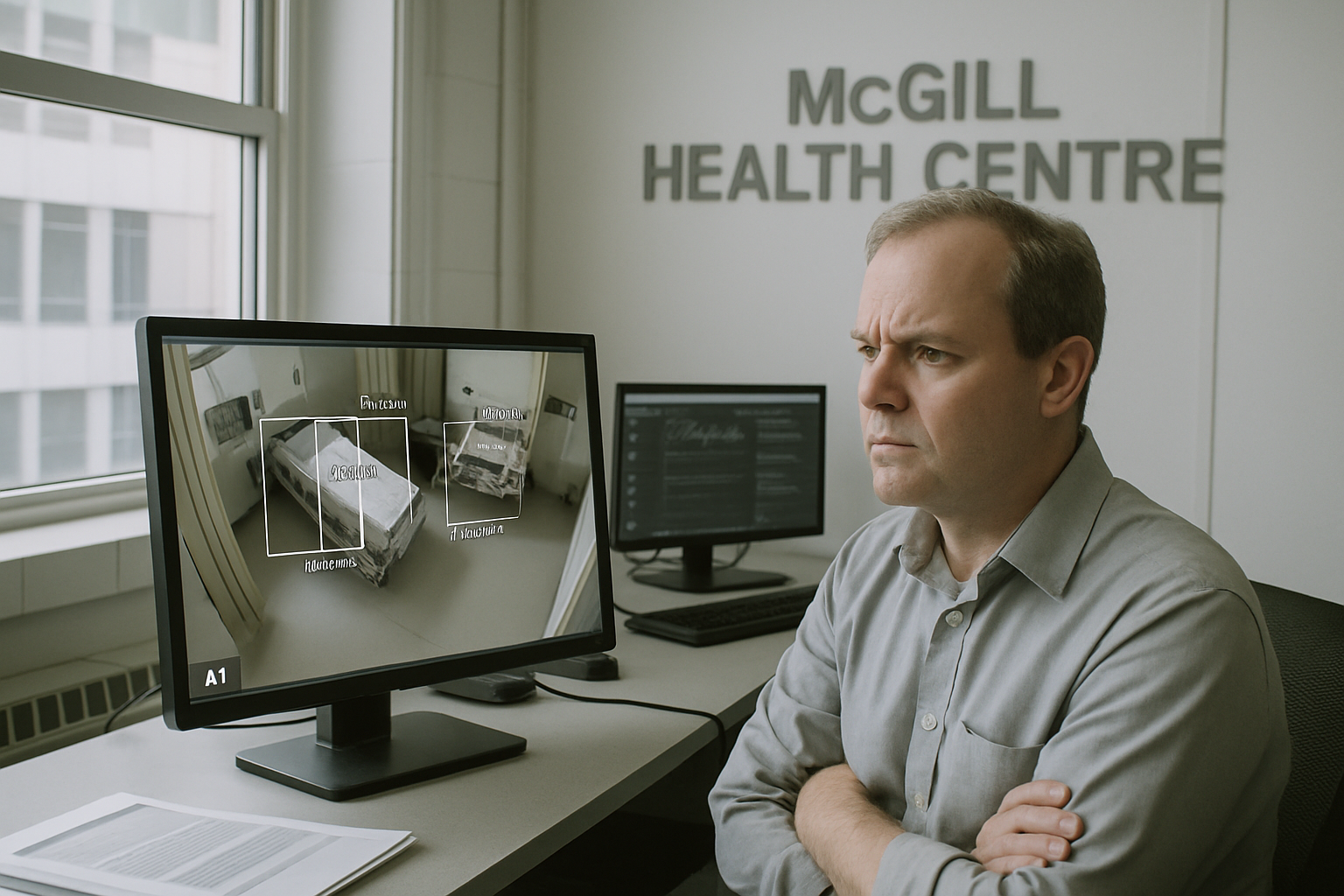Quick Take
- McGill University Health Centre launches AI monitoring system targeting hospital infections
- System uses ceiling sensors to track hand hygiene compliance in real-time
- Global healthcare AI market projected to reach $148 billion by 2029
- Canadian pilot could influence provincial rollouts across healthcare system
- Technology addresses $28 billion annual cost of hospital-acquired infections
Montreal General Hospital becomes first in Canada to deploy ambient AI for infection control, targeting 40% reduction in preventable patient harm
The McGill University Health Centre (MUHC) will launch groundbreaking artificial intelligence technology this fall at Montreal General Hospital. This marks a major step forward in the worldwide battle against hospital-acquired infections. The Artificially Intelligent Monitoring System (AIMS) becomes the first ambient AI system for infection control deployed in Canadian healthcare.
“Protecting patients from preventable harm is at the heart of our mission,” says Dr. Lucie Opatrny, President and Executive Director of the MUHC. “By introducing this technology, we are equipping our teams with another tool to reinforce best practices and deliver the safest care possible.”
Critical Healthcare Challenge Drives Innovation
Hospital-acquired infections strike between 5 and 15% of patients in developed countries during their care, according to the World Health Organization. Hand hygiene compliance remains the most effective way to prevent dangerous bacteria like MRSA and respiratory viruses. Yet monitoring stays inconsistent across healthcare facilities.
The healthcare AI monitoring market is growing rapidly. Projections show the global healthcare AI market could reach $148 billion by 2029. Infection control systems make up a $12 billion piece of this expanding market, pushed by increasing pressure to reduce preventable patient harm.
Real-Time Monitoring Through Ceiling Sensors
AIMS uses ceiling-embedded infrared sensors to monitor handwashing behavior anonymously throughout hospital units. The system gives instant feedback through green lights for 15-second compliance or yellow alerts with gentle audio cues when protocols need reinforcement.
Canadian tech firm Lumenix developed AIMS through extensive clinical trials, including validation by the Government of Canada. Previous deployments have shown sustained hand hygiene improvement and significant outbreak reduction in healthcare facilities.
“Patient well-being is our top priority, yet for too long health systems have struggled to reduce patient safety events,” explains Dr. Alan Forster, Director of Innovation, Performance and Quality at MUHC. “Perceptual ambient AI will complement the skills and commitment of our staff.”
Privacy-First Design Addresses Security Concerns
The system’s “privacy by design” approach tackles growing concerns about healthcare data security. All processing happens on-site, ensuring sensitive information never leaves MUHC infrastructure. This local approach sets AIMS apart from cloud-based monitoring solutions that raise data governance questions.
Strategically, AIMS offers hospitals competitive advantages through better patient safety metrics and operational efficiency. However, implementation risks include staff adaptation challenges and potential technology dependencies as healthcare workers embrace new monitoring systems while maintaining clinical focus.
Global Market Opportunity
This development impacts major healthcare markets facing similar infection control challenges. In the United States, hospital-acquired infections cost the healthcare system over $28 billion annually. The UK’s NHS faces parallel challenges, with infection control ranking among top patient safety priorities.
European Union healthcare directives increasingly emphasize technology-driven prevention strategies. India’s rapidly expanding hospital network presents massive opportunities for AI monitoring systems, while Canadian provinces watch MUHC’s pilot closely for potential provincial rollouts.
Multi-Year Partnership Expands Beyond Hygiene
The MUHC-Lumenix collaboration will extend beyond hygiene monitoring to include fall prevention, patient wandering detection, and medication compliance. The IMPACT Centre, MUHC’s AI Centre of Excellence, will speed up integration of data and digital technologies across hospital operations.
Canadian healthcare system adoption could accelerate significantly, with provincial health authorities potentially implementing similar systems by 2027. This timeline reflects growing recognition that ambient AI represents the next evolution beyond traditional compliance tracking methods.
Industry Transformation Through Academic Leadership
The partnership shows how academic health centers can drive sector-wide transformation through technological innovation. MUHC’s pioneering implementation sets the stage for widespread adoption of ambient monitoring technologies as hospitals worldwide grapple with infection control challenges.
The system’s clinical validation through multiple trials provides confidence for global adoption. It offers a replicable model for healthcare organizations seeking technology-driven safety improvements. As infection control remains a top priority globally, solutions like AIMS offer hope for dramatically improved patient outcomes through strategic technology deployment.
Strategic Implications for Healthcare Leaders
Healthcare executives should evaluate AI integration opportunities, focusing on privacy-compliant solutions that complement existing clinical workflows. Partnership strategies with healthcare AI developers can co-create industry-specific applications while budget allocation for staff training ensures successful technology adoption.
Developing data governance frameworks that support AI monitoring while maintaining regulatory compliance will become increasingly critical as ambient intelligence transforms patient safety protocols across the healthcare sector.






